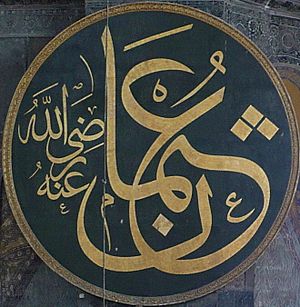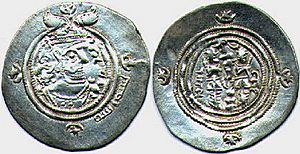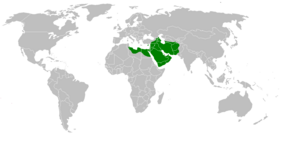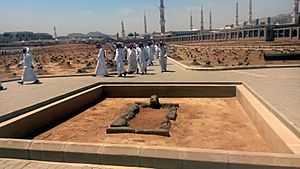Uthman facts for kids
Quick facts for kids Uthmanعثمان |
|
|---|---|
|
|

Calligraphic seal featuring Uthman's name, on display in the Hagia Sophia
|
|
| 3rd Caliph of the Rashidun Caliphate | |
| Reign | 6 November 644 – 17 June 656 |
| Predecessor | Umar ibn Al-Khattab |
| Successor | Ali ibn Abi Talib |
| Born | c. 573 or 576 (46 BH) Taif, Hejaz, Arabia (present-day KSA) |
| Died | 17 June 656 (aged 80–83) (12/18 Dhu al-Hijjah 35 AH) Medina, Hejaz, Rashidun Caliphate (present-day KSA) |
| Burial | Jannat al-Baqi, Medina |
| Spouse |
|
| Issue (among others) |
|
| Tribe | Quraysh (Banu Umayya) |
| Father | Affan ibn Abi al-'As |
| Mother | Arwa bint Kurayz |
| Religion | Islam |
Uthman ibn Affan (Arabic: عثمان بن عفان, romanized: ʿUthmān bin ʿAffān; c. 573 or 576 – 17 June 656 CE) was an important companion and son-in-law of the Islamic prophet Muhammad. He was also the third of the Rāshidun, or "Rightly Guided Caliphs."
Uthman was born into a well-known family in Mecca, called Banu Umayya, which was part of the Quraysh tribe. He played a big role in early Islamic history. He is famous for ordering the creation of the standard version of the Quran, Islam's holy book. When Caliph Umar ibn al-Khattab died, Uthman became the next leader. He was the oldest person to become Caliph.
During Uthman's time as leader, the Islamic empire grew a lot. It expanded into areas that are now Iran and Afghanistan. The conquest of Armenia also started. However, his rule also faced many protests and problems. These issues eventually led to a revolt and his assassination.
Uthman married Ruqayya, one of Muhammad's daughters. After she passed away, he married her sister, Umm Kulthum. Because he married two of Muhammad's daughters, he was given the special title Dhū al-Nurayn, meaning "The Possessor of Two Lights." He was also the brother-in-law of Ali, the fourth Rāshidun Caliph, who was married to Muhammad's youngest daughter, Fātimah.
Contents
Uthman's Family and Early Life
Uthman was born to Affān ibn Abi al-'As and Arwa bint Kurayz. Both of his parents came from wealthy families in the Quraysh tribe in Mecca. Arwa's mother was Umm Hakim bint Abd al-Muttalib, which made Arwa Muhammad's first cousin. This meant Uthman was Muhammad's first cousin's son. Uthman also had one sister named Amina.
Uthman was born in Taif. The exact year he was born is debated, with some saying 576 and others 583. He was one of the few people in Mecca who knew how to write when Islam began.
His father, Affan, died young while traveling. Uthman inherited a lot of money from him. Like his father, Uthman became a merchant. His business did very well, making him one of the richest people among the Quraysh.
Uthman During Muhammad's Time
Becoming a Muslim
In 611, Uthman returned from a business trip to Syria. He heard about Muhammad's message. After talking with Abu Bakr, Uthman decided to become a Muslim. Abu Bakr then took him to Muhammad to declare his faith. Uthman was one of the very first people to accept Islam.
His decision to become a Muslim made his family, the Banu Umayyah, very angry. They were strongly against Muhammad's teachings at that time.
Moving to Abyssinia
In April 615, Uthman and his wife, Ruqayya, moved to Abyssinia (which is now Ethiopia). They went with ten Muslim men and three women. Many other Muslims joined them later. Uthman already had business friends in Abyssinia. He continued to work as a trader and his business kept growing.
After four years, news reached the Muslims in Abyssinia that the Quraysh in Mecca had accepted Islam. This news made Uthman, Ruqayya, and 39 other Muslims decide to return. However, when they arrived in Mecca, they found out the news was false. Even so, Uthman and Ruqayya stayed in Mecca. Uthman had to start his business again, but his old contacts in Abyssinia helped him. His business soon became successful once more.
Moving to Medina
In 622, Uthman and Ruqayya were part of the third group of Muslims to move to Medina. When they arrived, Uthman first stayed with Abu Talha ibn Thabit. Soon after, he bought his own house. Uthman was one of Mecca's wealthiest merchants. He did not need financial help from the local Muslims, called Ansari brothers. He had brought a large amount of money with him to Medina.
Most Muslims in Medina were farmers and not very interested in trade. Most of the trading in the town was done by Jews. Uthman saw a great chance to encourage trade among Muslims. He quickly became a successful trader in Medina. With hard work and honesty, his business thrived, making him one of the richest men there.
Life in Medina
When Ali married Fatimah, Uthman bought Ali's shield for five hundred dirhams. Four hundred of these coins were set aside as a mahr (a gift from the groom to the bride) for Fatimah's marriage. The remaining hundred were for other expenses. Later, Uthman gave the shield back to Ali as a wedding gift.
Battles
Uthman was present at many important events during Muhammad's life. He participated in the Farewell Pilgrimage in 632, the year Muhammad died. Uthman was also at the event of Ghadir Khumm.
Uthman and Caliph Abu Bakr
Uthman had a very close relationship with Abu Bakr. Abu Bakr was the one who helped Uthman become a Muslim. When Abu Bakr was chosen as the first caliph, Uthman was one of the first people to support him. During the Ridda wars (wars against those who left Islam), Uthman stayed in Medina. He served as Abu Bakr's advisor. When Abu Bakr was dying, he told Uthman that Umar should be the next caliph.
How Uthman Became Caliph
When Umar was dying, he created a committee of six people. These six were to choose the next caliph from among themselves. The committee members were:
- Ali
- Uthman ibn Affan
- Abd al-Rahman ibn Awf
- Sa'd ibn Abi Waqqas
- Zubayr ibn al-Awwam
- Talha
Umar asked the committee to decide within three days after his death. The new caliph should then take office on the fourth day. If Talhah joined the committee in time, he could take part in the discussions. If he did not return to Medina, the others could still make their decision. Abd al-Rahman bin Awf stepped back from being a candidate. He offered to help guide the discussion. He spoke with each committee member separately. He asked them who they would vote for. When Ali was asked, he did not answer directly. Uthman said he would vote for Ali. Zubayr said "Ali or Uthman," and Saad chose Uthman.
Uthman was a wealthy merchant who used his money to help Islam. However, before becoming caliph, he had not shown much leadership or led an army. Despite this, the electors chose him. He was seen as the strongest candidate against Ali. This was because he had some family ties to Muhammad, similar to Ali.
Uthman's Rule as Caliph (644–656)
Around 650 AD, Uthman noticed small differences in how the Quran was spoken. This happened as Islam spread beyond the Arabian Peninsula to places like Persia, the Levant, and North Africa. To keep the holy text pure, he ordered a group led by Zayd ibn Thabit to create a standard copy. They used the copy made during Caliph Abu Bakr's time. So, within 20 years of Muhammad's death, the Quran was written down in a final form. This text became the model for all other copies throughout the Muslim world. Other versions are believed to have been destroyed.
While Shī‘ah Muslims use the same Qur'an as Sunni Muslims, they believe Muhammad himself gathered and compiled it during his lifetime. They do not believe Uthman was the first to compile it.
Economic and Social Changes
Uthman was a smart and successful businessman from a young age. This helped the Rashidun Empire greatly. His predecessor, Umar, had set up a public allowance system. Uthman increased this allowance by about 25%. Umar had also banned selling lands and buying farm lands in conquered areas. Uthman removed these rules, believing that trade could not grow otherwise. Uthman also allowed people to borrow money from the public treasury.
Under Umar, a rule was made that lands in conquered areas would not be given to soldiers. Instead, they would stay with their original owners. The army was not happy about this, but Umar enforced the rule strictly. Uthman continued this policy. There were more conquests, and the money from land increased a lot.
Umar was very strict about using money from the public treasury. He took only a small allowance for himself and did not accept gifts. He also did not let his family accept gifts. During Uthman's time, these rules became less strict. Uthman still did not take a personal allowance or salary from the treasury, as he was already rich. However, unlike Umar, Uthman accepted gifts and allowed his family to do the same from certain sources. Uthman believed he had the right to use public funds as he saw fit, and no one criticized him for this. The economic changes Uthman made had a big impact. Muslims and non-Muslims in the Rashidun Empire enjoyed a good economic life during his rule.
Military Growth
During Uthman's rule, his military strategy was more independent. He gave a lot of military power to trusted relatives like Abd Allah ibn Amir, Mu'awiya I, and Abd Allah ibn Sa'd. This was different from Umar's more central control. This independent approach allowed the empire to expand further, reaching areas like Sindh in modern Pakistan.
Muawiyah I was made governor of Syria by Umar in 639. His job was to stop attacks from the Byzantine Empire by sea. He took over after his older brother Yazid ibn Abi Sufyan died in a plague. Under Uthman's rule in 649, Muawiyah was allowed to build a navy. This navy was made up of Christian and Muslim sailors and troops. It defeated the Byzantine navy at the Battle of the Masts in 655. This victory opened up the Mediterranean Sea for the Muslims.
In 651 AD, Uthman sent Abdullah ibn Zubayr and Abdullah ibn Saad to take back the Maghreb (North Africa). They met the army of Gregory the Patrician, a Byzantine leader. This battle was called the Battle of Sabuthilag (or Sufetula). Abdullah ibn Zubayr saw Gregory and led a small group to attack him. Gregory was killed, and the Byzantine army lost its spirit and was defeated.
Some Muslim historians say that after conquering North Africa, Abdullah ibn Sa'd continued to Spain. They claim that two of Abdullah ibn Saad's generals invaded the coastal areas of Spain by sea. They were helped by a Berber force. It is believed they succeeded in conquering some coastal parts of Al-Andalus. It is not clear exactly where they landed or what resistance they faced. However, it seems Muslims did conquer some parts of Spain during Uthman's time, possibly setting up settlements on the coast.
To the east, Ahnaf ibn Qais, a skilled commander, continued military expansions. He defeated Yazdegerd III near the Oxus River in Turkmenistan. He also crushed a group of Sassanid loyalists and Hephthalites in the Siege of Herat. Later, the governor of Basra, Abdullah ibn Aamir, also led successful campaigns. These included stopping revolts in Fars, Kerman, Sistan, and Khorasan. He also opened new areas for conquest in Transoxiana and Afghanistan.
In 652 AD, Balochistan was re-conquered during a campaign against a revolt in Kermān. This was the first time western Balochistan came directly under the Caliphate's laws. It paid a tax on its crops.
Overall, the military campaigns under Uthman were successful. Only a few in the kingdom of Nubia, on the lower Nile, did not go as planned.
Public Problems with Uthman's Policies
Why People Were Unhappy
Uthman's government noticed growing tension against the Caliphate. Around 654, Uthman called all twelve provincial governors to Medina to talk about the problem. During this meeting, Uthman ordered that all decisions should fit the local situations. Later, in a council of ministers, it was suggested that reliable people be sent to different provinces. Their job was to find out where the unhappiness was coming from.
Uthman sent Muhammad ibn Maslamah to Kufa, Usama ibn Zayd to Basra, Ammar ibn Yasir to Egypt, and Abdullah ibn Umar to Syria. The people sent to Kufa, Basra, and Syria reported that things were generally fine. People were mostly happy, though some had small personal complaints. However, Ammar ibn Yasir, who went to Egypt, did not return to Medina. Rebels in Egypt were spreading ideas to make Ali the next caliph. Ammar ibn Yasir, who was close to Ali, joined the Egyptian opposition against Uthman. Abdullah ibn Saad, the governor of Egypt, reported on the opposition's actions. He wanted to act against Muhammad ibn Abi Bakr (Ali's foster son), Muhammad bin Abi Hudhaifa (Uthman's adopted son), and Ammar ibn Yasir.
Uthman Tries to Calm Things Down
In 655, Uthman asked anyone with a complaint against the government, as well as governors and officials from across the caliphate, to gather at Mecca for the Hajj (pilgrimage). He promised that all fair complaints would be fixed. So, many groups from different cities came to share their complaints.
The rebels realized that the people in Mecca supported Uthman. They were not interested in listening to the rebels. This was a big win for Uthman. It is said that before returning to Syria, Governor Muawiyah, Uthman's cousin, suggested that Uthman come with him to Syria, where things were peaceful. Uthman refused. He said he did not want to leave Muhammad's city (Medina). Muawiyah then suggested sending a strong force from Syria to Medina to protect Uthman. Uthman also refused this. He said Syrian forces in Medina would cause a civil war, and he did not want to be part of that.
Revolt Against Uthman
The politics in Egypt played a big role in spreading negative ideas against the caliphate. So, Uthman called Abdullah ibn Saad, the governor of Egypt, to Medina to discuss what to do. Abdullah ibn Saad came to Medina, leaving his deputy in charge of Egypt. While he was away, Muhammad bin Abi Hudhaifa led a coup d'état and took power. When Abdullah heard about the revolt in Egypt, he rushed back. But Uthman could not give him any military help, so Abdullah could not stop the revolt.
Some Sunni scholars have reported that several important companions of Muhammad asked Uthman to step down. They mentioned reasons like showing favoritism to family members and spending too much.
Rebels in Medina
Groups of about 1,000 people each were sent to Medina from Egypt, Kufa, and Basra. Each group had orders to kill Uthman and overthrow the government. Representatives from Egypt met Ali and offered him the Caliphate, but he refused. Representatives from Kufa met Al-Zubayr, and those from Basra met Talhah. They each offered their loyalty as the next Caliph, but both were also refused. By suggesting other leaders, the rebels changed public opinion in Medina. Uthman's supporters could no longer stand together. Uthman had the active support of the Umayyads and a few other people in Medina.
Siege of Uthman's House
At first, the siege of Uthman's house was not very serious. But as days passed, the rebels increased their pressure. When pilgrims left Medina for Mecca, the rebels became even stronger, and the situation got worse. The rebels knew that after the Hajj, Muslims from all over the Muslim world might come to Medina to help Uthman. So, they decided to act against Uthman before the pilgrimage ended. During the siege, Uthman's supporters, who were more numerous than the rebels, asked to fight. But Uthman refused. He wanted to avoid bloodshed among Muslims. Unfortunately for Uthman, violence still happened. The gates of Uthman's house were shut and guarded by the famous warrior Abd-Allah ibn al-Zubayr, along with Ali's sons, Hasan ibn Ali and Husayn ibn Ali.
Uthman's Death
Assassination
On June 17, 656, the rebels found the gate of Uthman's house strongly guarded. Some Khwarij climbed over the back wall and sneaked inside. The gate guards did not know this. The Khwarij entered Uthman's room and attacked him. Some of Uthman's slaves fought back. One slave killed an assassin but was then killed by the Khwarij.
Funeral and Burial
After Uthman's body had been in his house for three days, his wife Naila asked some supporters to help bury him. Only about a dozen people came forward. These included Marwan, Zayd ibn Thabit, and others.
Naila followed the funeral with a lamp. But to keep it secret, the lamp had to be put out. Naila was joined by some women, including Uthman's daughter.
The body was taken to Jannat al-Baqi for burial. Some people gathered there and tried to stop Uthman from being buried in the Muslim cemetery. So, Uthman's supporters later buried him in the Jewish graveyard behind Jannat al-Baqi. Decades later, the Umayyad rulers tore down the wall between the two cemeteries. They combined the Jewish cemetery into the Muslim one. This made sure Uthman's tomb was now inside a Muslim cemetery.
The funeral prayers were led by Jabir bin Muta'am. The body was lowered into the grave with little ceremony. After the burial, Naila and Aisha wanted to speak, but they were advised not to, because of possible danger from the rioters.
Why People Revolted Against Uthman
The exact reasons for the revolt against Uthman are debated by Shia and Sunni Muslims. According to Sunni sources, Uthman was less strict than his predecessor, Umar. He focused more on making people economically successful. Under Uthman, people became richer and had more freedom in politics. However, there were no clear ways for people to express their political views. Because of this, old tribal rivalries, which had been stopped under earlier caliphs, started again. People took advantage of Uthman's gentle approach. This became a problem for the government and led to Uthman's assassination.
According to Wilferd Madelung, people had good reasons to complain about Uthman's actions. Historical records mention many wrongdoings he was accused of. It was only his violent death that made him a martyr and a "Rightly Guided Caliph" in Sunni belief. According to Keaney Heather, Uthman chose his advisors based only on his own wishes. This led to decisions that caused resistance among Muslims. His way of ruling made Uthman one of the most debated figures in Islamic history.
The resistance against Uthman grew because he favored family members when choosing governors. He thought this would give him more control over the caliphate and improve the economic system he wanted. However, the opposite happened. His chosen officials had more control over him than he planned. They even ruled their provinces like dictators. Many anonymous letters were sent to important companions of Muhammad. These letters complained about the supposed unfair rule of Uthman's governors. Letters were also sent to public leaders in different provinces about Uthman's family misusing power. This caused unrest in the empire. Finally, Uthman had to investigate to find out if the rumors were true.
Uthman's Appearance and Character
The historian al-Tabari wrote that Uthman was of medium height. He had strong bones and broad shoulders. He walked with a slight bow in his legs. He was said to have large limbs, with fleshy shins and long, hairy forearms. People often described him as very handsome with fair skin. However, up close, light scars from childhood smallpox were visible on his face. He had a full reddish-brown beard, which he colored with saffron. His thick, curly hair grew past his ears, but his hairline was receding at the front. His teeth were held together with gold wire, and his front teeth were especially nice.
Unlike Umar, Uthman was not a great speaker. He became tongue-tied during his first speech as caliph. He was somewhat different from the other close companions of Muhammad. He was an elegant, educated, and cultured merchant-prince. He stood out among his poorer friends. Muhammad himself had noticed this trait. One story says that Aisha noticed Muhammad relaxed and spoke casually with Abu Bakr and Umar. She asked him why he neatly arranged his clothes and acted formally when he spoke to Uthman. Muhammad replied that "Uthman is modest and shy. If I had been informal with him, he would not have said what he had come here to say."
Uthman was a family man who lived a simple life, even after becoming caliph. This was true even though his successful family business had made him rich. Earlier caliphs were paid for their work from the public treasury. But Uthman, being wealthy, never took a salary. Uthman was also a kind person. He usually freed slaves every Friday. He cared for widows and orphans and gave a lot to charity. His patience and strength helped him be a successful leader. To take care of Muhammad's wives, he doubled their allowances. However, Uthman was not completely plain and simple. He built a palace for himself in Medina, called Al-Zawar. It had notable doors made of precious wood. Although Uthman paid for the palace with his own money, some Shia Muslims saw it as his first step toward ruling like a king.
Uthman was asked why he did not drink wine before Islam, when it was allowed. He answered: "I saw that it completely took away the intellect, and I have never known anything to do this and then return completely."
Uthman's Legacy
Most Sunni Muslims and Sunni historians have a positive view of Uthman's rule. They especially note his gentle approach. In their view, his supposed favoritism involved relatives like Muawiya and Abdullah ibn Aamir. These relatives proved to be good at both military and political leadership. Historians like Zaki Muhammad accused Uthman of corruption, especially regarding Waleed ibn Uqba. From a perspective of empire growth, Uthman is seen as skilled in handling problems. This is clear from how he managed the difficult early Muslim conquered areas, like Kufa and Basra. He sent the restless Arab settlers on new military campaigns and expansions. This not only solved internal conflicts in those settlements but also expanded the Rashidun territory. It reached as far west as southern Iberia and as far east as Sindh, Pakistan.
See also
 In Spanish: Uthmán ibn Affán para niños
In Spanish: Uthmán ibn Affán para niños
- List of Sahabah
 | John T. Biggers |
 | Thomas Blackshear |
 | Mark Bradford |
 | Beverly Buchanan |




